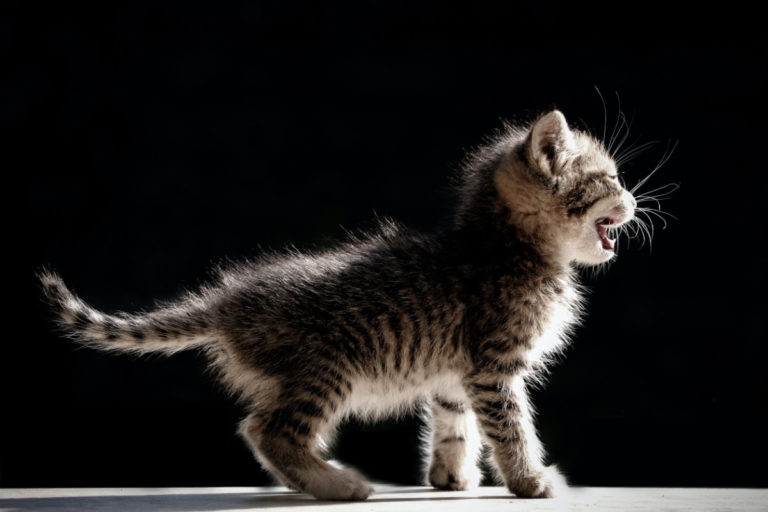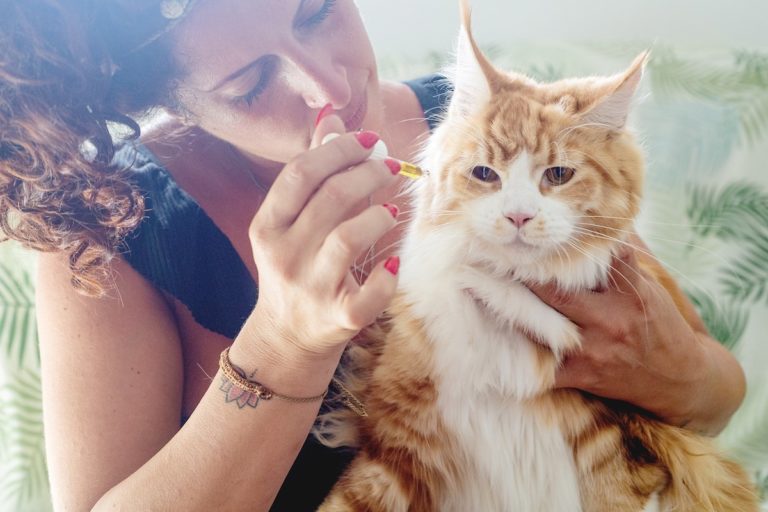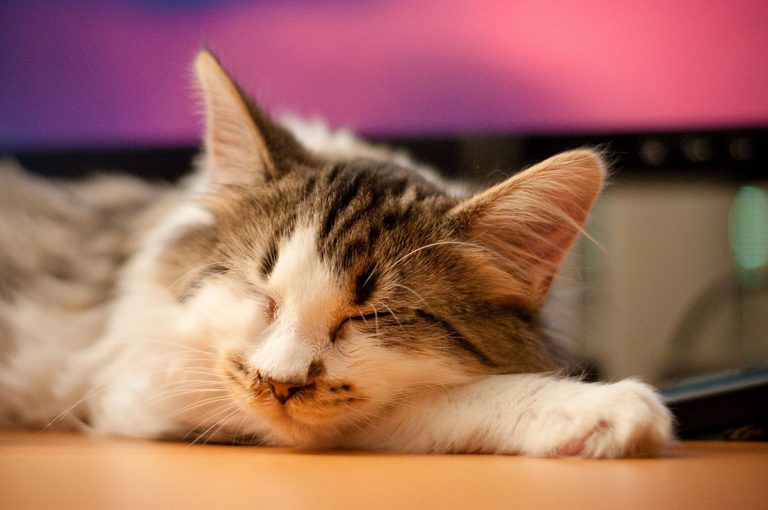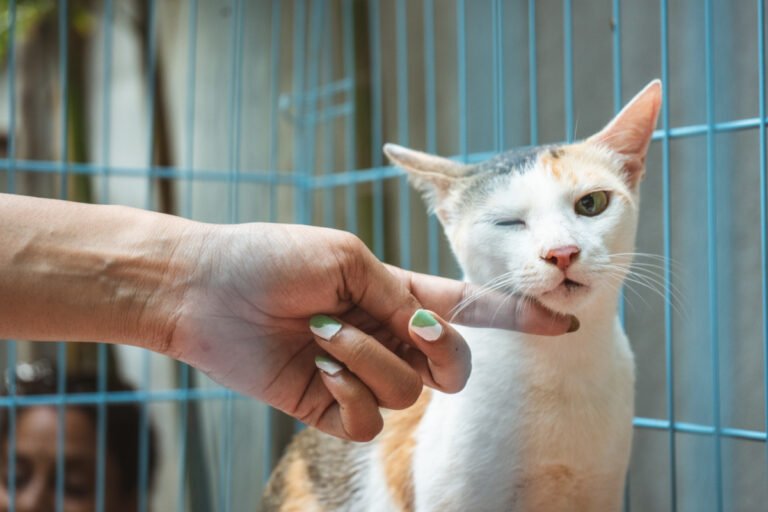How to deal with the loss of a cat is a question we’d rather not think about. But as cat guardians, we inevitably have to face the passing of one of our beloved felines. Here are some tips on how to process such a tragic loss.
DISCLAIMER: This post may contain affiliate links. If you click one of these links and decide to make a purchase, we may receive a small commission. This comes at no extra cost to you and helps to keep the site alive and up to date. If you want more information, please review our Privacy Policy. Thank you for your support!
Preparing For A Pet’s Death
A cat’s passing is a difficult thing to prepare for. Even more so if it happens unexpectedly. Cats can have heart attacks, allergic reactions, and many more illnesses and injuries that might take them from us in the blink of an eye. As sad as it is to even consider, it is important to have at least some sort of plan in place, like you would for yourself or your human family members.
Store the number for your local animal emergency service together with your vet’s number on your phone, so you don’t have to look for them in case of an emergency. Take your cat to the vet regularly for check-ups, including blood work. Especially if she is getting older. The sooner you catch diseases like diabetes and chronic kidney failure, the better your chances of extending her life in any meaningful way.
If your cat does get ill or just really old, you will have a bit longer to mentally prepare yourself. But don’t get yourself down too much. Try to get the most from the time you spend with her now that she is still here. Take a few extra pictures and soak in those precious moments.
When Is The Right Time?
Deciding when it’s time to let your ailing cat go is undoubtedly the most difficult decision you will ever have to make for her. When cats reach the end of their life after struggling with disease, they rarely just slip away. Instead, they like to hide their pain and soldier on for as long as their organs let them.
You will probably see your cat go up and down for a bit, going back and forth between strong enough for a cuddle and maybe half a meal, and just sitting there in silent agony. And you’ll start to realise that the time is near…
Unfortunately, no one can tell you, her caretaker, when is the right time. Not even your vet. You know your cat best. If she is in clear agony, the decision is probably easy to make. In other cases, the best advice I can give you is to look at what your cat’s days look like.
Is she having more bad days than good? Has the definition of a “good day” gotten drastically worse? Then the right time might be now.

Who Should Be There?
The next decision you will have to make is who is going to be there before and when your cat passes. You want to give everyone who cared for her a chance to say goodbye. Don’t forget your friends and extended family. They might have their own bond with your pet.
If you have younger children, or kids that are especially sensitive, you probably don’t want to take them to watch the actual euthanasia. A cat that has passed away still looks rather alive, because the eyes remain open. This can be too scary for your kids.
You also want to make sure that the whole experience, as devastating as the end result may be, isn’t too stressful for your cat. If too many people are there and fussing over her, she can become anxious because it is a clear deviation from her routine. Try to act normal, as far as circumstances will allow.
How And Where To Lay Your Cat To Rest?
Lastly, you have to decide where your cat’s final resting place will be. Most people choose to bury their deceased pets in the backyard. Although this is a nice way to keep your cat with your family, backyard burials may not be the best idea.
For one, other animals can pick up the scent of your dead cat’s body and scavenge on it. That’s not only devastating for you, but also toxic to them, since your cat has a large amount of chemicals in her bloodstream.
Second, more and more local governments are actually banning the practice of burying pets in the backyard to protect nature and other animals. If you are still considering it and you live in the United States, please check this site for the exact laws surrounding pet burials in your state.
Talk To Your Children
If you have children, don’t forget to prepare them as well, even if your cat’s passing seems far out of sight. The key is to be honest, but let them indicate the level of detail they want by letting them ask questions. Don’t use euphemisms, like “she flew away” or “she went to the farm”. This will only confuse your child and give them hope that they might see her again, or leave them wondering what they did wrong to cause their pet to leave.
Teenagers might not be willing to show their emotions. Try to encourage them to not keep it bottled up and tell them it’s okay to cry and feel sad over this. Validate their feelings by sharing your own grief with them.
What To Do After Your Pet Has Passed
Short disclaimer: I don’t know what the formal steps of the grieving process are. I have, however, had to say goodbye to cats before. The last one only very recently. This is just my take on how I experienced it, and am still experiencing it.
Grieve
I must say, I was surprised by the impact my cat Link’s death had on me. I expected to be really sad and to miss her a lot. I would take the day, and maybe the next. Then I’d definitely be back at work.
I was really sad and I did miss her a lot. But on top of that, I felt about five flavors of guilt mixed with some gut-wrenching doubts and an undertone of soul-crushing loneliness. I was effectively paralysed by my emotions. Whenever I sat down at my desk to do some work, I would just break down in tears. It didn’t help that I work from home and my cat would always be right there, like a furry sidekick.
After a day and a half of this, I realized that I needed to take it more seriously. So I took some time off work to make room for my grief. The guilt I felt over deciding it was time to end it. Did I wait too long? Or not long enough? The guilt I felt over neglecting my still living cat when her sister was sick. How painful it was sitting in the same places where I used to sit with her.
I needed a couple of days to work through all of that, and you likely will too. But it’s important that you take that time. Find a place for everything you feel and slowly get used to your new normal. Of course, there will still be moments when the sadness overwhelms you. And that’s okay. Take as much time as you need to feel better.
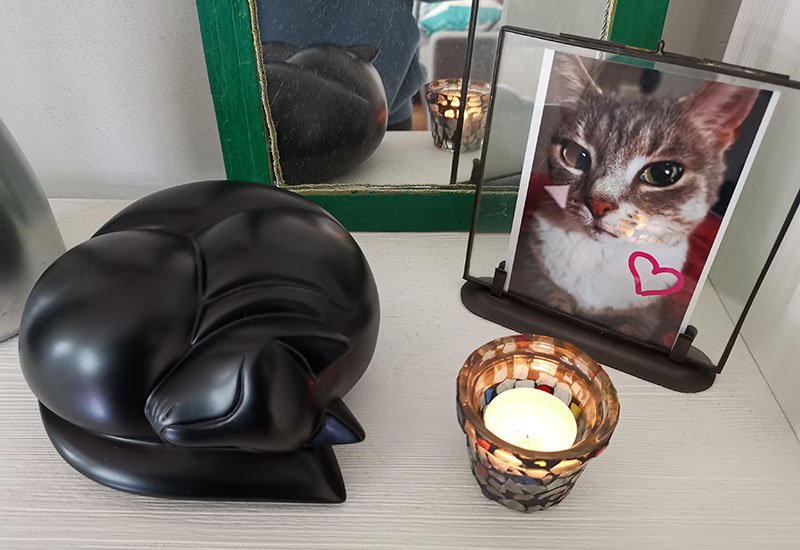
Hold A Ceremony
We don’t hold funerals for pets like we do for humans. Which is weird, really. Our pets are generally closer to us than most of the people in our lives. Losing the unconditional love they give to us can be devastating and deserves to be paused over.
When your family pet dies, take a moment to come together to remember and say goodbye. Give everyone a chance to share a beautiful memory and express their gratitude. And their sadness. If your culture has specific rituals surrounding someone’s passing, try to perform these for your pet too. Most of these rituals were designed to (mainly) soothe the souls of those left behind anyway, so why not make use of that?
I was raised in a Christian tradition and, even though I am not religious myself, I do like the practice of lighting candles for the deceased. Whenever someone dies, whether it be a pet or a human, I keep a candle lit for them every day until they are laid to rest, to help them find their way to the other side.
Rituals like these create a natural place and time for the grief that you are feeling. It allows you to go through and deal with all of the complex emotions tied to death in a controlled way. Then, hopefully, it becomes a bit easier to move on.
Ignore People Who Don’t Understand
Not everyone has pets. So not everyone will understand what you are going through. Someone who has never experienced a bond based on pure, unconditional love like you had with your pet will not get the depth of your grief. “Get over it. It’s just a pet.” If that is the type of reaction you get from someone when you share about your deceased dog or cat, don’t engage. Walk away if you have to, but stop the conversation.
Hang out with someone who knew your pet and knows how much they meant to you. They will likely understand that you need to talk about it and provide a listening ear. Don’t expect too much in terms of their response, though. Death is a difficult subject no matter how you come at it. Most people probably won’t know what to say to you when your pet has died.
Find Ways To Honor And Remember Your Cat
The day my cat was cremated, I was looking out the window into the garden. I saw what I thought was a leaf go down in a straight line towards my kitchen door, which has a cat door in it. The cat door was open at the time. I didn’t think anything of it at first, but then I heard a sound in the kitchen. Apparently, this leaf was in fact a pitch black butterfly and it was now fluttering against the kitchen window.
It wasn’t until I let the butterfly out and watched it fly away that the oddity of the situation struck me. I live in the Netherlands (born and raised) and I have never in my life seen a black butterfly. Yellow, white, orange, brown… An occasional blue one, if you’re lucky. But pitch black? Never. And it didn’t flutter in by accident either. It really made a beeline for the cat door.
Now, I know that from a down-to-earth scientist’s point of view (which I am, most of the time) it is completely ridiculous to consider that as more than a coincidence. But as a person grieving from the loss of my precious cat, I needed it to mean something.
After some googling and reading a few sites that I would normally avoid for fear of being called a superstitious fool, I found something that resonated with me. Apparently, in Christian culture, a black butterfly appearing somewhere after a death is seen as the soul of the deceased returning to the place where it felt the happiest during its lifetime.
Whether I truly believe that or not is beside the point. It resonated with me, because I know for certain that my cat was happy with me in life. That realisation allowed me to let go of much of the guilt I felt surrounding her death. On top of that, I now get to remember her in a beautiful way every time I see a butterfly fluttering through the garden.
Final Thoughts
Saying goodbye to a beloved cat is difficult, but an inevitable part of life. Limit some of the stress you are no doubt going to feel by putting a plan in place. Research your options for laying them to rest, so you can concentrate on your cat when the day finally comes. Remember that it’s okay to feel sad. Natural, even. Don’t let anyone tell you to get over it until you are ready to let it go. In the meantime, don’t forget about any pets that are still alive. They might give you just the comfort you need at a time like this.



